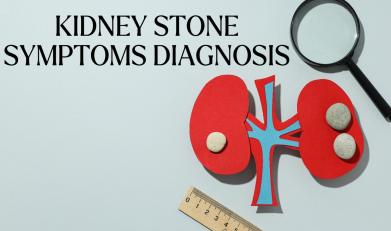

20 Jul, 2024
Kidney stones are hard deposits made of minerals and salts that form inside your kidneys. They can affect any part of your urinary tract, from your kidneys to your bladder. Passing kidney stones can be extremely painful, but they usually cause no permanent damage if they're recognized in a timely fashion. Understanding the symptoms and the process of diagnosis is crucial for managing and treating this condition effectively.
The symptoms of kidney stones can vary based on the size and location of the stone. Some common symptoms include:
Severe Pain
Flank Pain: Sudden, intense pain in the side and back, below the ribs.
Radiating Pain: The pain may radiate to the lower abdomen and groin.
Waves of Pain: The pain often comes in waves and fluctuates in intensity.
Urinary Symptoms
Painful Urination: Experiencing a burning sensation while urinating.
Frequent Urination: Feeling the need to urinate more often than usual.
Urgency to Urinate: A persistent urge to urinate even when the bladder isn’t full.
Discolored Urine: Pink, red, or brown urine, indicating the presence of blood.
Other Symptoms
Nausea and Vomiting: These symptoms can accompany severe pain.
Fever and Chills: If an infection is present along with the kidney stones.
Cloudy or Foul-Smelling Urine: Indicating a possible urinary tract infection.
When you experience symptoms that suggest the presence of kidney stones, your healthcare provider will use a variety of diagnostic methods to confirm the diagnosis and determine the appropriate treatment.
Medical History and Physical Examination:
Your doctor will begin by discussing your medical history and conducting a physical examination.
You will be asked about the nature and location of your pain, urinary symptoms, and any other relevant factors.
Imaging Tests:
CT Scan: A high-resolution scan that can detect even small stones.
Ultrasound: A non-invasive test often used for pregnant women or those who should avoid radiation.
X-ray: A KUB (kidneys, ureters, bladder) X-ray can show the size and location of some stones.
Urine Tests:
Urinalysis: Checking for blood in the urine, signs of infection, and crystals that indicate stone formation.
24-Hour Urine Collection: Measuring the levels of stone-forming and stone-preventing substances in your urine.
Blood Tests:
These tests can reveal the levels of certain minerals and electrolytes that can cause stones.
Stone Analysis:
If you pass a stone, it can be retrieved and analyzed to determine its composition, which helps in identifying the cause and preventing future stones.
Kidney stones can be a painful and disruptive condition, but understanding the symptoms and undergoing proper diagnostic procedures can lead to effective treatment and management. If you suspect you have kidney stones, seek medical attention promptly to receive the appropriate care. By working closely with your healthcare provider, you can take steps to prevent future stones and maintain your overall kidney health.